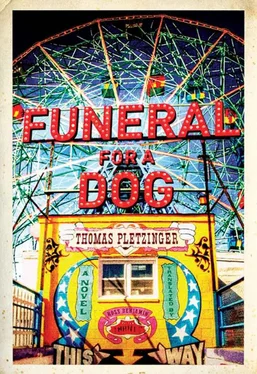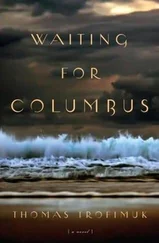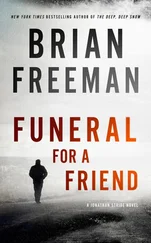Now, two weeks later on the Coney Island beach, Kiki Kaufman takes my hand in hers, the hand with the hole in the middle, and under her fingers the throb in the wound disappears. The three of you miscalculated, she says, you’re like Borromean rings. Lua’s still sleeping, and Kiki takes advantage of his sleeping and his looking away, she strokes me around the eyes as if she were wiping away a tear. A little boy in a bathing suit walks across the beach to the water, dragging an inflated rubber Superman behind him. Kiki holds my wounded hand to her cheek and asks if I want to come along to Fire Island, maybe to Sagaponack, to Great Neck or Port Washington, even better all the way to the end of the island, to Montauk, where there’s a lighthouse and a proper view of the Atlantic, the deeper water. For two weeks now she’s been taking pictures of rubble, of Lua and me in my bloody T-shirt. Kiki shines in the autumn sun as she talks about her pictures. For two weeks she’s basically been a camera, now it’s enough. She has recorded how the city’s been divided into war and peace, she’s photographed the hoisting of flags for and against, and both would have stood equally well in the wind. She has understood that she’s always seen things too simply. Kiki sits in the sand and smiles at me. What you could see with your own eyes, what you could touch, she says, never made it onto the television sets. She’s been taking pictures to verify her own perception, she has failed. Kiki wakes Lua and tosses him the last cheeseburger. Her toes dig in the sand and find a bottle cap, they give it to me. Ultimately her camera is only a crutch for her ideas, she says, for her it’s about making something new out of the photos and stories, she still has some paint in the car. We should head off. Kiki is right: I’ve told enough, I’ve drunk too much and eaten too little, I think, burying my telephone and Tuuli’s collected cigarettes in the sand. Kiki is right, I think, we should get out of here. I’ll climb into her Honda, drive past the carousels and the shooting galleries, down Surf Avenue, under the F train and along the ocean. A view would be good, I say to Kiki Kaufman, let’s go to Montauk.
(The deeper water)
It looked like a storm, the clouds were still hanging in the San Gottardo, Svensson said after the Ping-Pong match, fetching a bottle of Lugana from the kitchen, they would be here sometime in the afternoon (north-south weather divide). He didn’t usually drink, he said, as he uncorked the bottle. Only today. And when he did drink a glass on special occasions, he didn’t move his boat an inch. So I could safely take a sip myself, because I would be staying here (he was still wet from his dip). Svensson simply refused to take me, and at the same time he raised his wine glass as if there were something to celebrate:
Chin-chin!
So I sat with Tuuli, Svensson, and his seventy-seven chairs, and to my own astonishment I took the glass handed to me without hesitation and said “to the storm” (the first cicadas in the oleander). Despite my departure plans, despite my flight booking, and even though my luggage is waiting for me. Maybe tomorrow, Svensson laughed, and I tried not to let any indignation show (my superior and wife is waiting too). Svensson refuses me Ping-Pong victories and answers, then he hands me a glass and wants me to stay (he exploits the full potential of his silence). Chin-chin! The momentary question of why Svensson doesn’t want to get rid of me. Tuuli and he don’t seem to talk to each other much, I don’t seem to be intruding here. There was something to celebrate, Svensson said, and maybe he needs witnesses for this celebration. The three of them paid no further attention to me: Svensson emptied his wine in one gulp and carried a few of the black garbage bags across the property, Tuuli took off her nightshirt and changed into a green bikini as if I weren’t there. She lay down on an intact lounge chair in the shade of the oleander and smoked, only occasionally she smiled in my direction. The boy examined the dog with a broken chair leg as if with a stethoscope. I strolled back and forth across the property, I weighed my possibilities, I played with the ring in my pocket, I watched the playing boy, finally I gave up my scheduled plan (“To enable the perception of social life with all the senses, the ethnological method of participant observation is traditionally based on long field stays within the group under investigation”). In the early afternoon I then fell asleep in Svensson’s room without another thought about the return flight (maybe I wanted to miss the flight).
Chiarella
I wake up when the bedroom door is shut softly from outside. The pigeons are cooing, now and then chainsaws and the splintering of falling trees, the swallows merely little dots in absolute blue (the afternoon sky completely cloudless over the smooth lake). The small, pretty mother in the green bikini was in my room while I was sleeping. Her scent is still hanging in the air. On the floor next to my head is an open bottle of water (Chiarella) and a glass (Duralex), under them a torn-out page from my notebook with a handwritten note. The passing thought of not reading the note and leaving Svensson’s ruin. But I don’t know the way, and my plane to Hamburg has already taken off without me (this is your story now, Mandelkern). This evening Elisabeth will close up her office and return to our apartment, but I won’t be there. Mandelkern, she’ll ask, are you there? Elisabeth will wait and wonder where I am. Mandelkern? Whether I’m going to come back at all. Daniel? Whether I’ve decided against our marriage.
between the animals
Another note: “Do we want to conduct an immanent analysis of the concept ‘relationship’ and jettison all contextual references, Prof. Mandelkern?” Elisabeth wrote the message on a promotional postcard for the Brittany tourism agency and put it in my papers, I found it at work in the Museum of Ethnology on Rotherbaumchaussee (my laughter in the witch archive). Back then I divided my time between Elisabeth, my dissertation, and work at GEO . Then our first trip together in spring 2003 to the Atlantic, Elisabeth’s divorce was on the horizon, but I didn’t hear anything about that (she kept all that separate from me). We parked the Renault in the middle of a village square, the restaurant (Le Pélican) was a large room with three long tables and no menus, there were carrots and lobsters for everyone. I had to understand, Elisabeth said, as she opened her lobster claws more skillfully than anyone else at the table, that her first marriage took place at another time and in another place (the sound of the nutcracker in her nimble fingers). Yes, I said, I did understand that. Around us French was being spoken, we drank wine from scratched decanters.
Chin-chin!
said Elisabeth, between the lobsters she shared cigarettes with a retired foreign currency dealer from Paris, I had to dance with his granddaughter. At night we refilled the Renault’s cooling water from the fountain and I drove us past fields and stone walls, Elisabeth with her eyes closed in the backseat, she sang “ Der Rote Wedding ”( Rotfront! she sang, Rotfront! ). Then we slept on a wool blanket next to a few menhirs (back then we were the same age).
Petrarch & Simpson
Elisabeth and I made a loop around France (we circled each other). We drove the Renault through Brittany, then along the Spanish border and the Côte d’Azur, we slept in the places that the guidebooks passed over. Every morning I woke up two hours before Elisabeth, read essays, and wrote my notes. She abstained from croissants, I got used to black coffee and observed Elisabeth sleeping in the various pension beds (I failed at sketching her beauty). When she woke up, we immediately set off. She sat in the passenger seat of the Renault and read to me from culinary guides. Two warm meals a day, I got used to Ricard and Pernot and entrails (I still sometimes hated brains and intestines). Elisabeth ordered the red wines, we drank them together. I always got to drive, sometimes she talked on the phone with her husband and I tried not to listen (we learned our rituals). One weekend we visited two of her writer friends in a small village at the foot of Mont Ventoux (Venasque), they spent the summer there with their novels and plays (this is Daniel, said Elisabeth, you’re going to have to like him, I love him). After two days of conversations about books and plays and the view of the bare mountain I wanted to move on (Côte Luberon, Côte du Rhône). Elisabeth chose the memorial to the racing cyclist and first doping fatality Tom Simpson (her strange interest in cyclists, the races themselves she never followed). As we finally forced the Renault torturously over the summit, she read to me from Petrarch, However, the mountains of the province of Lyons could be seen very clearly to the right, and to the left the sea at Marseille and at the distance of several days the one that beats upon Aigues Mortes. The Rhône itself was beneath my eyes. At the Simpson memorial she placed a full bottle of wine next to dozens of water bottles, flowers, and jerseys. Simpson died of dehydration, she explained, and I took note of her words, he’d ingested only whisky and wine and amphetamines (“put me back on my bike” were his last words, or maybe “go on, go on,” they haven’t been precisely imparted).
Читать дальше












